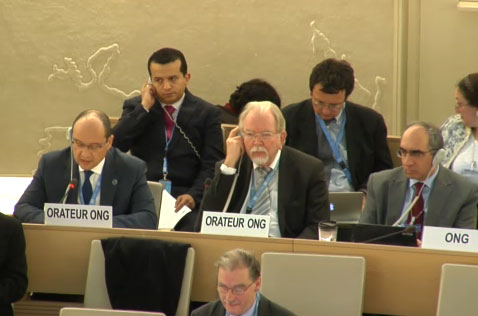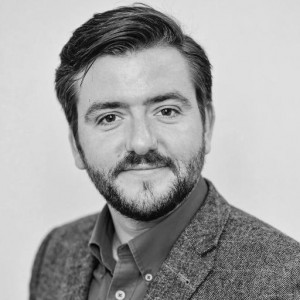As a delegate of the International Humanist and Ethical Union (IHEU) at the United Nations over a 12 year period, former Head of Delegation, Roy Brown, reflects on the issues, the achievements, and the challenges still faced by our international institutions.

Roy Brown preparing to deliver his final speech as an IHEU delegate to the UNHRC, 9 March 2016
Exactly 12 years ago this week, on 9th March 2004, I gave my first speech at what was then the UN Commission on Human Rights; it was against blasphemy laws. This week, on my last day at the Human Rights Council I spoke again on blasphemy. It might seem that nothing has changed in the intervening years but much has, some good, some bad.
First, I was no longer a lone voice crying in the wilderness. The IHEU now has a strong team of regular representatives at the Council under the leadership of Dr Elizabeth O’Casey, and we have the support of delegations from Center for Inquiry and the British Humanist Association in bringing a humanist perspective to the work of the Council.
Secondly, our Humanist voices have occasionally made a demonstrable difference in the outcome of debates and in resolutions adopted by the Council. For one thing, we are no longer faced with repeated resolutions on “Defamation of Religion”. On the last occasion on which that resolution was adopted, in 2010, we were instrumental in obtaining support from 200 other NGOs in opposing it and briefing against it. The voting was so close that the writing was on the wall for the Islamic states’ attempt to create an international law against blasphemy. But even today they have not given up. We can expect this current session of the Council to see renewed attempts to ban criticism of Islam, albeit in the guise of new euphemisms.
It was a great surprise to me when I first started attending what was then the Commission for Human Rights to discover just how blatant was the hypocrisy, bias and selectivity of the member states. All seemed to be more interested in defending their own human rights abuses and attacking their political enemies than honouring their obligations to protect and promote human rights.
In 2005, then UN Secretary General Kofi Anna had become so disgusted with the performance of the old 53 state Commission for Human Rights that he scrapped it. His dream was that it be replaced by a new Human Rights Council comprising 47 member states, all pledged to uphold, protect and promote human rights within their own jurisdictions. After a year of debate Annan’s ideas had been watered down to the extent that the bias and selectivity of the Council are virtually indistinguishable from those of its predecessor.
In the early days we were criticised for making joint statements with, among others, the late David Littman of the World Union of Progressive Judaism, condemning for example calls to kill Jews in Egyptian, Saudi and Palestinian school books, these last funded by the EU. To this day I make no apology and find such criticism utterly misplaced. Either you support human rights wherever and whenever they are abused, or you do not.
There is no doubt that the climate for respect for human rights worldwide has markedly worsened over the past years. Some states have even stopped paying so much as lip service to basic rights. Many states have introduced legislation purportedly to combat terrorism which seriously restrict both privacy and freedom of expression. And some, most notably India, have argued that they can’t afford to spend money on human rights when their right to development has not been recognised. New “blasphemy” laws have appeared in countries as diverse as Russia, India and Ireland, and attempts have been made to undermine freedom of expression using weasel words such as “Complementary standards”. The Islamic states continue to condemn “Islamophobia” (under which they may variously include any given criticism of Islamic beliefs, practices, figures and institutions) as a form of racism. One such attempt, again being used as an excuse to push for “defamation of religion” restrictions, was thwarted when we were able to show that far from being an organic response, protests against an anti-Islamic YouTube video had been drummed up by an Egyptian Islamist TV station.
In addition to preparing written statements and giving speeches in the plenary of the Council, we have been able to contribute behind the scenes in informal sessions discussing the texts of draft resolutions and by holding parallel events, such as seminars on freedom of expression during Council sessions. Among our successes were getting wording promoting the use of contraception into a resolution on maternal mortality, and in highlighting threats to both freedom of expression and the universality of human rights posed by initiatives such as the Cairo Declaration of Human Rights in Islam, under which all rights are subject to the Holy Sharia!
The biggest event that IHEU sponsored was a whole-day seminar on the Victims of Jihad (2005), featuring women, Islamic scholars, Christians, Jews and homosexuals. The texts of the speeches were then published as contributions to the record of the now defunct Sub-committee on Human Rights.
Since 2009, IHEU has, with the hard and detailed work of Keith Porteous Wood and the National Secular Society (UK), been instrumental in having the UN Committee on the Rights of the Child roundly condemn the Holy See for its obstruction in covering up the world-wide scandal of child sexual abuse by Catholic clergy.
Our minor triumphs included an occasion when 10 minutes before Center for Inquiry was due to speak we spotted an opportunity to produce evidence of torture in Iran. I scribbled a speech which was delivered by our Canadian-Pakistani colleague Raheel Raza. It forced the Iranian ambassador who spoke next to admit that torture does indeed take place in Iran “although it is not government policy”.
I can’t say goodbye without thanking all of our colleagues, too numerous to mention who have assisted in the often daunting task of bringing light and reason to the Council.
It has been said that the Human Rights Council is the “conscience of the world”. But what is absolutely clear is that NGOs, including IHEU and our allies, are the conscience of the Council.
It is vital that the voices of Humanism continue to be heard in the world’s most influential forum for human rights. Long may the IHEU delegation be at the forefront of those efforts
Roy Brown

Andrew Copson, president of the IHEU
Andrew Copson, president of the IHEU, said Friday:
“Huge thanks are due to Roy Brown, not only on the part of IHEU for coordinating our UN work over a long period, but more broadly on the part of anyone anywhere who is concerned with human rights and humanist values. We must also say congratulations for his many achievements, all the more impressive against the backdrop of an institution with so many failings built in, and which he has done so much to highlight.
I could hardly put it better than Roy himself in saying that if “the Human Rights Council is the “conscience of the world”… [then the] NGOs, including IHEU and our allies, are the conscience of the Council.” We speak more freely than Member States, we are there because we believe in internationalism and in universal human rights, and the IHEU will continue, under the coordination of our new Head of Advocacy, to play a principled, brave and leading role.”
Roy’s final speech as an IHEU delegate, delivered Wednesday 9 March 2016, can be watched online via webtv.un.org (number 17) follows below:
International Humanist and Ethical Union
UN Human Rights Council 31st Session
Speaker: Roy Brown, 9 March 2016
ID with SR on Freedom of Religion or Belief
Oppression in the Name of ReligionMr President
We thank Professor Bielefeldt for his report with which we wholeheartedly concur, and we congratulate him of the exemplary way in which he has fulfilled his mandate.
As his report reminds us: “freedom of religion primarily confers a right to act in accordance with one’s religion but does not bestow a right for believers to have their religion itself protected from all adverse comment”.
It is one of the ironies of international politics that several member states of this Council – who should be at the forefront in the defence of freedom of religion or belief – have led so many distasteful attempts to undermine that right. The OIC has consistently used charges of Islamophobia to condemn expressions of concern about some aspects of Islamic law, such as the stoning of women for adultery or its draconian punishments for apostasy, and to equate these concerns with hatred of Muslims. Every decent person must surely be concerned by the continuing imprisonment of Raif Badawi in Saudi Arabia and still under sentence to receive a further 950 lashes,[1] and surely this Council should condemn last month’s sentence of 2000 lashes and 10 years’ imprisonment against a man for expressing his atheism on the internet.[2]
In India we see the ugly face of Hindu nationalism where several rationalist and Dalit leaders have been murdered in recent years and where last month the authorities arrested Kanhaiya Kumar, president of Jahalawal Nehru University Student Union and a stalwart defender of India’s secular constitution, on a charge of sedition.[3]
In Russia an atheist Viktor Krasnov faces a possible one-year jail term under a 2013 law against “insulting the religious convictions of believers” for denying the existence of God.[4] Yet it is his absolute right under international law, as it is for any non-believer, to express their non-belief. Has the Russian government forgotten it is a signatory to the ICCPR?
In our report: Freedom of Thought 2015 we show that there is hardly a state in the world where freedom of religion or belief are fully respected.[5]
Mr President, we urge the Council to heed and act upon all of Professor Bielefeldt’s reports on both freedom of religion and belief and the right to express those beliefs. If the Council fails to do so it will surely be seen as a further step on its path to irrelevance.
Thank you[1]http://www.bbc.com/news/world-middle-east-34667260
[2]http://www.independent.co.uk/news/world/middle-east/saudi-arabia-sentence-man-to-10-years-in-prison-and-2000-lashes-for-expressing-his-atheism-on-a6900056.html
[3]http://indianexpress.com/article/india/india-news-india/afzal-guru-film-screening-jnu-student-leader-held-for-sedition/
[4]http://www.theguardian.com/world/2016/mar/03/russian-atheist-faces-year-in-jail-for-denying-existence-of-god-during-webchat
This post was updated to correct an error in the dating.